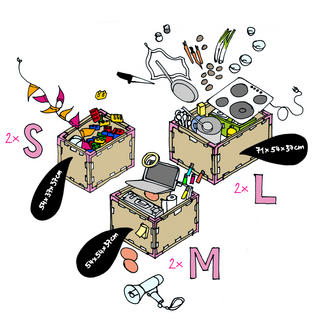
THE »MITMACH-DING«
»BAUHAUS MEETS THURINGIA - THE MOBILE PARTICIPATION LAB«
The aim of the project was to strengthen the university's exchange with local and regional civil society and to address current issues for teaching. The aim was to create a multifunctional, mobile setting that can be used to implement projects at learning locations outside the campus. All participants engaged in workshops with participatory approaches and developed special methods.
Sponsored until March 31th of 2024 by the »Stiftung für Innovation in der Hochschullehre«: stiftung-hochschullehre.de/projekt/moplab/
If you are interested in a Cooperation please contakt (mitmachding[at]uni-weimar.de) us!
MITMACH-DING goes Gaberndorf
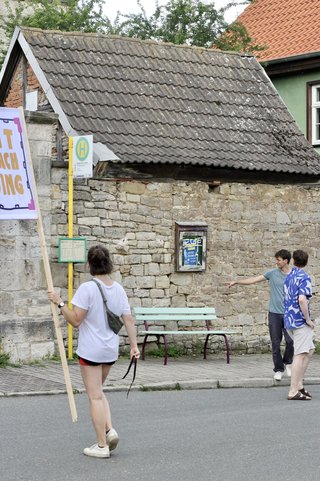
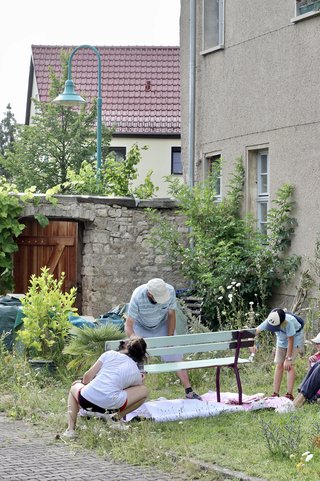
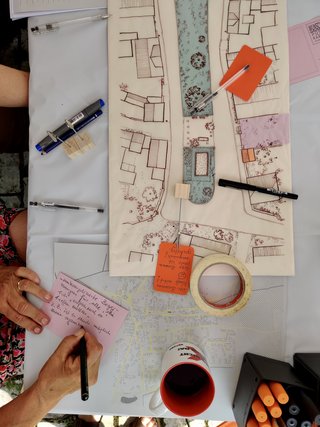
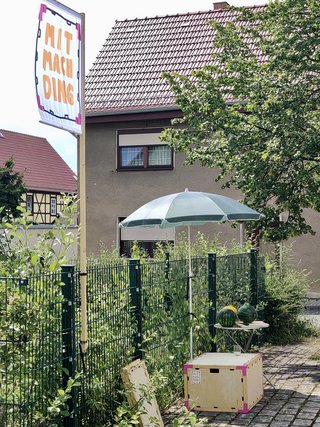
"WHAT HAPPENS AT THE VILLAGE KIOSK?
On 21.07.2024, as part of our joint master's thesis, we were in Gaberndorf
as part of our joint master's thesis to find out at a workshop how the
the near future of the Angers and a possible kiosk on the former estate.
former estate. In the ideas workshop at the village fountain
participants were able to write all their wishes, criticisms and ideas on a map.
ideas on a map. However, we also really wanted to get down to
get down to business. To this end, the building workshop ran in parallel inside the
which was open to all interested parties on the day.
We had a sanding machine, paintbrush and paint roller with us to give the somewhat
the somewhat run-down bus stop bench with the help of a few villagers.
with a fresh coat of paint with the help of a few villagers. After all the
conversations that day, we had the feeling that it was now time to
time to try out a few of the small ideas that were put forward and show
show how quickly they can be changed through collective initiative in everyday
can be changed.
Anna, Lando, Felix & Deni"
MITMACH-DING as an "Awareness Point" at the Summaery 2024
As part of her seminar work, Carolina Garcia created the "Awareness Point" with the Equal Opportunities Office. The MITMACH-Ding served as a mobile infrastructure for an eye-catching meeting point.
“During the Opening Party of the annual exhibition »summaery2024« at
July 11 2024, the Mitmach-Ding was used as Awareness Point in front of
the main building. The area was created to be an open and chill space to
the students and visitors, following the concept of “Beyond Borders”
created by the students involved in the party organization (as part of
Bauhaus Module “Re-connect”)
The awareness point main role was to be a meeting spot for the awareness
team and also to raise more visibility to the awareness work. The
intention of the team was to make sure the party would be a place with
no discrimination and experienced as a safer space. In case someone
faced some issue related to discrimination, boundary violations and as
well as any disrespectful attitudes, the awareness team was available to
establish and maintain a considerate, responsible, and supportive
interaction. A safer room inside the main building was used as support
for the awareness work, together with the securities working at campus
that night.
The implementation of the Awareness Point was only possible thanks to
the Equal Opportunity Office, the Awareness team from Bauhaus-Univesität
Weimar, the Coordinator of Mitmach-Ding Hannah Kordes and the students
Carolina Fernandes Garcia Pinto, Gabriela Carrillo Quintero and Lara
Mohring-Landsberger from the Bauhaus Module “Re:connect: open space
summaery 2024 SoSe2024”, supervised by Prof Peter Benz, Friederike
Kempter, Max Merkel and Ioannis Oriwol.”
Photos by Thomas Müller
ACTION AT THE DAY OF TEACHING AND LEARNING 2024
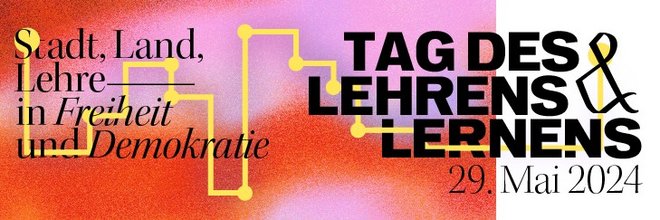
We invite all students, doctoral candidates, staff and professors to the Day of Teaching and Learning on May 29, 2024.
Under the motto “Stadt, Land, Lehre - in Freiheit und Demokratie” (City, Country, Teaching - in Freedom and Democracy), we will join you in taking a look at teaching in uncertain times. Take part in keynote speeches, workshops and discussion rounds and let's explore together what contribution teaching can make to promoting democracy and freedom! The MITMACH-DING will also be on the road!
Information on the program and registration can be found at: www.uni-weimar.de/tll
Continuation until summer 2024
Since May, project support has been extended until the winter semester. Interested parties can therefore once again apply for projects together with MITMACH-DING. We are looking forward to the summer semester.
Projectdocumentation and final steps of continuation
After almost 15 months of the project, we as the team from the mobile participation laboratory "MITMACH-DING" are drawing a first conclusion and venturing a look ahead to a more cooperative relationship on and off campus. It should be noted that it takes a few months for such an "innovative" teaching and learning project to establish itself as a useful tool in the minds of the various internal and external university staff. It takes time to get to grips with the complex and by no means barrier-free topic of "participation". Why do we need it at all? We think we know ourselves what is best. How does the Bauhaus University Weimar want to deal with this topic in the future? How important should "making common cause" be? How much participation is desired and even possible in which area? With the "MITMACH thing", we repeatedly noticed that previous structures within and outside the university make cooperation difficult. We tested how we could get students excited about the topic and anchor it in their teaching across faculties with the help of seminars, workshops and individual support for final theses. It would be desirable if these interdisciplinary impulses could also be made possible in the long term. We have built up a network of leading participation experts in German-speaking countries that can be accessed for this purpose. Inquiries can still be submitted to University Development via the contact function on the project website.
Uncertainties about how exactly the mobile participation lab "MITMACH-DING" works and what exactly can be done with it have repeatedly come up as questions in discussions. We have therefore developed a manual as project documentation to provide a kind of instruction manual. Apart from facts about the basics of participatory design, you can understand what exactly was done during the STIL funding project period and how it was created in the first place. There are also assembly instructions so that future users know how the mobile can be used. It provides an overview of the various modules and how to assemble the individual settings. The inventory will probably remain in the possession of University Development and will be managed from here. The mobile will hopefully remain available for loan for activities on campus or in the region. There is an intuitive booking system on the website for this purpose, through which every request will then land with the future managing entity.
Once again, we would like to thank all those involved (especially Constructlab and Christine Pavlic for their constructive support, Grit Koalick for the graphic design, IPG and nonconform for their knowledge of participation and the teachers and students involved) who helped shape the development process of the mobile participation lab and we look forward to the next steps so that we can do even more together! - whether on campus or with the region!
Intervention Neighbourhood in Schönblick


Shortly before Christmas, it was time to head out into the cold for the hands-on thing. Equipped with tea and cookies, surveys and playful activities were carried out:
"The neighborhood 'Am Schönblick'
A participatory action in a Weimar single-family house estate. As part of the seminar: "Planning with existing buildings. Concern for the single-family house" of the Faculty of Architecture and Urbanism, led by Jan Engelke and Hans-Rudolf Meier in the winter semester 2023/24, we spent a semester dealing with current challenges and future potentials of single-family houses.
To this end, we used the mobile participation laboratory Mitmach-Ding in December 2023 to carry out a participatory action 'Am Schönblick', a street within a single-family housing estate in Weimar. In relation to this street, we were particularly interested in the topic of neighborhood and community. In order to find out more about the experiences and experiences of the neighbors and to exchange ideas about the potential of neighborly community, we invited the residents to a joint discussion with tea, punch and gingerbread on December 16th between 1 and 5 pm. We asked the question: What makes this neighborhood special and what potential does it have?
The event was a complete success. Numerous neighbors took part and shared anecdotes, memories, photographs of past joint events and historical information with us. The results of the campaign were incorporated into the development of an exhibition contribution, which was presented at a final seminar slide exhibition. This exhibition may be shown in summer 2024 as a temporary contribution to the exhibition "Sorge um den Bestand" of the Association of German Architects (BDA) in Erfurt." Students: Laura Semper, Helena Bogner, Lomme De Boeck
Trip to "Erfurter Kreuz"


On 28.11.2023, 21 urban studies students traveled to the "Erfurter Kreuz" industrial estate to examine the built work culture in Thuringia using its example and to talk to people who live/work there. In snow and ice! LEG gave us an insight into the processes involved in developing spaces on such a field/ scale. There was a lot to discover on a walk through the streets. The mobility concepts and the spaces between housing and large-scale logistics were particularly interesting. The students will go on to conduct further interviews and research in working groups in order to gain more knowledge about the world of work in Thuringia and develop proposals for sustainable transformations.
HOW TO - Participation with IPG
We invited the Institute for Participatory Design (IPG) from Oldenburg to provide input across seminars and faculties. The four-hour workshop serves as a consolidation of the keynote lecture the evening before. It is aimed at students of architecture and urbanism and offers the opportunity to further deepen the knowledge of participatory processes presented in the introduction and to link it to the students' projects:
- Review of the keynote lecture: We will start with a short summary of the
keynote to ensure that all participants are at the same level of knowledge.
level of knowledge.
- Practice-oriented group work: The participants work together in small groups
together to develop participatory solutions for their own semester projects.
develop. This can include topics such as citizen participation methods, communication with
stakeholders or other forms of participation.
- Plenary session: In the plenary session, we reflect together on the results from the small groups in order to
to see different approaches and perspectives and possibly link them together.
be able to link them together.
The aim of this four-hour workshop is to deepen the students' understanding of participatory
processes in architecture and urbanism and to provide them with practical skills that they can
skills that they can apply in their future projects.
"WANDERZIRKUS" with TU Berlin
The WANDERZIRKUS project is also funded by the Foundation for Innovation in Higher Education and has become aware of the MITMACH-DING. The aim is to jointly develop interdisciplinary methods to teach/learn sustainability and democracy critically, constructively and consistently. From 8-10.11.2023 we met with 25 other people from the German university landscape in Jena at IMAGINATA and exchanged ideas intensively. We at MITMACH-DING are also asking ourselves how sustainable development can work, for example. Grit Koalik (www.visuranto.de) was there again as our illustrator and captured both the atmosphere and the results. We all want to meet again in Essen in summer 2024 and continue thinking and doing until then. Great that we were able to participate and support. We are excited to see what else will develop from the confettia-affine concepts.
A MITMACH-DING FOR THE LAUSITZ?

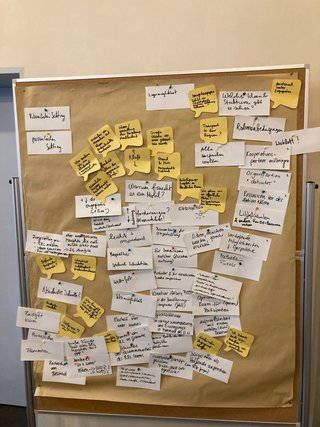
Time and again, we receive inquiries from other regional associations or universities. This time we were allowed to travel to Lusatia and tell the Bürgerregion Lausitz e.V. about our MITMACH thing. That was really great and at the end the statement was quite clear: "We also want to develop a mobile!". We are happy about this and are already very excited to see exactly what it will look like!
Trip to Schwarzburg


On 14.10 we were in Scharzburg to discover the place around the former boarding house "Haus Bräutigam" as part of the seminar project. In the next semester we will consider together what could be developed at this place in the future. So far, the generous green space around the house has been cleared of debris. At the time of the boarding house, it served as a lawn for the guests. Compared to other properties in Schwarzburg, the area is very generous - but also sloping. The students were encouraged to go on a discovery tour and to come into contact with the place and, if necessary, with people. It was interesting with which stories they came back after 1.5 hours tour. In small drawings they tried to visualize their route again. Directly in the garden we were made aware of the existing vegetation by the botanist of the University of Jena (Fabian Schneider). In the next seminar days groups will be formed, which can then work on concrete questions.
Start project "Gartenamateure" Wintersemester 2023/24
Sign in with Bison is possible until the end of the week!

Start into the wintersemester 2023/2024
This week the new semester starts and with it actions with the MITMACH thing. On Thursday evening we will be out and about on campus showing what the structural upgrade can do to hopefully implement many projects in the region during the summer semester. A booking system is also in the works right now thanks to the university's SCC service. We have published the next dates in the sidebars. Make a note of 15-16/11, when we will have another evening lecture and workshop on how-to-participate. We are already looking forward to the next weeks and the exciting actions and new joint design ideas!
UPGRADE for the MITMACH-DING


From 30.8-6.9 we used the workshop again to give the mobile tool a few upgrades. After the first actions last semester, we noticed a few things that could be improved. No problem with the modular construction and the materials used! Therefore we invited the artist Christine Pavlic (www.christinepavlic.com) to support us. The prototype developed by Construclab was taken apart again and improved here and there. Partly the weight of the boxes was a problem, because they were without handles black alone manageable. We re-milled these in each case. In addition, we had not come to a numbering of the modules in the last building workshop, which was also impractical in use, because you could then quickly lose track of where what is. In addition, we could not get into the somewhat narrower Weimar station elevator. Very annoying extra set up and take down when you've been out all day and just want to get home.... That's why it still needed a sturdy buggy to use when things get tight. Christine developed this and prefabricated it in her metal workshop. In Weimar we gave it a final polish and a pink color to match the Mitmach-Ding color scheme. The exciting thing is that the buggy is also modular and can be used in different ways. This makes the existing system even more four-way usable. We think it's really chic and are looking forward to using this »Mad-Max-Barbie« in the region!
NEW IMAGEFILM
»The University of Weimar wants to close the gap between science and civil society. A ›mobile participatory thing‹ is the central element of the ›MoPLab‹ project, which we are funding. With the vehicle, students and teachers move into the pedestrian zone to enter into an open dialog about urban design with people passing by.«
You can watch the video here:
stiftung-hochschullehre.de/blog/ein-mit-mach-ding-auf-raedern/
SUMMAERY23 RESUME






From 13-16.07.2023 the summer exhibition »Summaery23« took place on the campus of the Bauhaus University Weimar. A colorful weekend where students and teachers exhibit their topics and projects of the last months. Prizes are awarded and alumni travel from all over the world to meet again. We used the event to be on campus with the mobile to make the project better known and to talk to potential users. We also tried to gather impulses for the design of the upcoming winter semester. So-called »MITMACH ideas« could be filled out and were then visibly displayed in order to be able to become more concrete together at the »Open Meeting« on Friday afternoon. That was really nice! Some representatives from the region were present. In the end, some semi- to very concrete ideas were on the table, which will now be worked out in the next weeks. We are looking forward to get going again after the summer break and hopefully anchor the project as a permanent tool for collaboration at the university!

We cordially invite you to this year's SUMMAERY of the Bauhaus-Universität Weimar!
The MITMACH thing will be out and about on campus on Thursday, 7/13 from 5-7pm and on Saturday, 7/15 from 2-4pm.
On 7/14 from 3-5pm, we're hosting an open meeting where we'll share ideas on how the project can be further utilized and solidified in the coming months to enhance creative collaboration between the university and the region. We will be joined by the wonderful Institute for Heterotopia: heterotopia.blog.
A few exciting external guests have also already agreed to participate, such as the Landuni from Vienna: landuni.at
GOALS: Find concrete projects for the winter semester, strengthen networks, question of continuity.
SCEDULE:
15:00 Check-in (5 min/ Welcome, method overview, goals):
15:05 Fishbowl-Podium (30 min/ overview of positions/ potentials/ problems)
15:35 Agenda (10min/ audience/ gathering panel impulses through moderation).
With which topics/ projects do we want to go into the Open Space?
15:45 Break (10 min/ clustering of the tables by moderation)
16:00 Open Space (60min):
Presentation of the tables by moderation. Changes? Setting (10 min)
Brainstorming at the tables (30min)
Collection of results and next steps Presentation (15 min)
16:55 Check out (5 min) then common end with drinks
We ask for registration and look forward to making plans together!
LONG NIGHT OF ACADEMIC WRITING
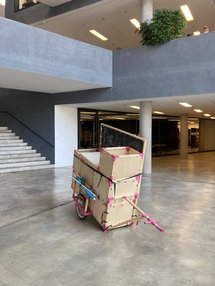

![[Translate to English:] (c) Thomas Müller](/fileadmin/_processed_/c/c/csm_tmue20230622a115_9d6fc757b0.jpg)
Sophie Foster of the Lernraum.Bauhaus used the MITMACH thing to deliver an AI workshop at the University Library's Long Night of Scholarly Writing:
»The AI Writing Lab aims to explore the effects of AI language generators on academic writing. Here, participants will learn how critiquing AI-generated texts can develop writing skills and recognise scenarios where AI can complement the writing process. The Lab will also encourage discussion on the potential repercussions of AI within academia and its impact on student learning. Throughout the duration of the Lab, participants will be introduced to the AI language generator ChatGPT by reading example texts it has produced as well as trying it out for themselves. From there, its benefits and limitations can be discussed leading to the creation of strategies that strike a balance between the use of AI and traditional writing assignments. The goal is to foster a critical approach to integrating AI in teaching and learning and agree on how we should adopt its use at our university in the future.«
ACTION IN WEIMAR






On 27.06.2023, 10 students and the team from MITMACH-Ding were at Herderplatz in Weimar. Under the motto "Dive in!", the citizens of Weimar were invited to the paddling pool for an exchange. Together, questions such as "Let's imagine the city was an outdoor pool - which character would you play in the outdoor pool, what do you like to do most?" should be clarified
ACTION IN APOLDA



On the 20.06. from 3-6pm the event "Immerse! The city as an outdoor pool" by students of the Bauhaus University Weimar took place on Apolda's market square. The square was temporarily transformed into an open-air swimming pool: There was a small diving tower, a sunbathing lawn - and of course a paddling pool, which on this hot day was of course especially enjoyed by the children. Afterwards, participating people from the city were able to show on a small city model what they would also like to see for Apolda's city squares from their outdoor pool role. They wished for more shady elements, communicative seating groups, spaces of togetherness - not only for people, but interestingly also for the city's mallards. The aim of the event was to point out the different roles in making the city and, of course, to playfully transform the public space for a few hours. Next Tuesday, 27.06., 12-6pm, a similar action takes place on the Weimar Herderplatz.
SEMINAR-ACTION "EINTAUCHEN" in Apolda and Weimar

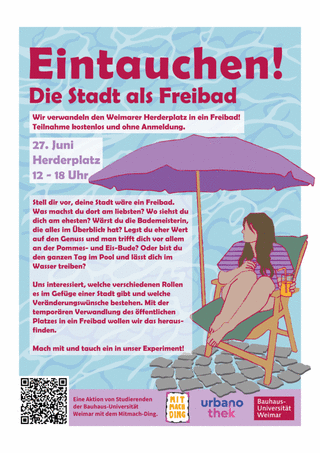
"What, the city has become an outdoor pool! Let's dive in."
Sometimes it's hard to find your way around all the hustle and bustle of the city. And it's even harder to understand what role I actually play in the city. We all make city, we are all city shapers - but in highly different ways: The culture of participation in cities is characterized by unequal speaker positions and invisibility of entire population groups. With the participation thing, we explore the diversity of roles and test alternatives. To do this, we unceremoniously transform two public squares into outdoor pools.
What if the city were an outdoor pool? Which character would you play in the outdoor pool, what do you like to do most? Would you be the lifeguard who has an overview of everything? Or would you spend the whole day in the pool and let yourself drift? Why? No prior knowledge or registration is required to participate, just curiosity. Where and when? June 20, Apolda marketplace, 3-6 p.m. June 27, Herderplatz Weimar, 12-6 pm."
The event tests the new participation thing of the Bauhaus University Weimar and takes place in the context of the Bauhaus.module "Urbanothek: on the road with the mobile participation lab", under the direction of Anton Brokow-Loga and Hannah Kordes.
HALFTIME: MITMACH-Booklet coming soon









It is now half time for the project MITMACH-Ding, the mobile participation lab of the Bauhaus University Weimar and it is now slowly but surely to think about how to continue with the mobile after the end of February 2024 (funding ends). What can you actually do with it? How can it be borrowed? Who will look after it at the university in the long term? We have been working on the first part of the handbook for a few days now, where you will not only learn how the mobile came to be, but also how to use it so that the university and the region can do more things together. Thanks to the many great drawings by Grit Koalick (www.visuranto.de) it is also fun to look at it all. Thanks! At our promotion at Summaery (13.-16.7), we will have some proofs with us. We are already looking forward to it :)
First actions!
Since June, the MITMACH thing has gone to different places a few times now! The main purpose was to test whether it is really possible to move with public transport. In addition, it is interesting to find out what kind of situation you are confronted with by the mobile. Which questions come up? Which people do we attract, which do we not? What do we need on the next trip? Which place will we visit next time? What will we experience there? Who else in the region can we motivate to do more with the Bauhaus University in the future?



PHOTOSHOOTING

To show how the MITMACH-Ding looks and works at the moment, we did a photo shoot. The special thing about our multifunctional trailer is that you can really disassemble it completely and adjust the size as needed. We will test it within the next days in Weimar and in public transport. Looking forward to it!
SPONTANEOUS USE OF TREFF.PUNKT.WEIMAR PROJECT



Students of the Bauhaus University spontaneously asked us if they could use the mobile to get in touch with the young people in Weimar. The goal is to provide creative support for a new meeting place for youth culture. To this end, the group has been promised 20,000 euros by the city of Weimar. The different modules and the board helped to collect first conversations and ideas on the so-called "KIWI" in Weimar. We wish the students much success in implementing their commitment to a place for youth culture in Weimar! It's great to see how relevant one's own creative competence can become for society, even during one's studies, if the exchange works out.
NAME CHRISTENING!

After a few months with the tongue twister "mobile participation lab", we have now settled on the name "Mitmach-Ding". This name was approved by several voices out of about 25 suggestions. The logo picks up the project colors orange and pink, as well as the functionality of the modular boxes. Depending on requirements, the mobile can be assembled larger or smaller. Particularly practical: it can be completely disassembled in just a few steps, which is important for transportation on public transport. On Thursday - after the impulse lecture by IPG - we will toast to it!
We are looking forward to the upcoming adventures in Thuringia!
START OF THE LECTURES


The summer semester has begun and with it the phase of the first uses or the further development of the previous mobile setting. Within the interdisciplinary course "Urbanothek" with the chair of social science urban research, 12 students are dealing with the question "how the design, planning and politics of space can become more tangible for everyone". It is also interesting to see how the mobile participation lab can be anchored as a tool on the university in the long run, in order to use it to bring together students and their competences/learning readiness and the civil society of the region and its issues. The project is still in the design phase in many details and therefore still very open and designable. For example, the project still needs a crisp name, because the term "participation" alone raises question marks and negative associations in many people. In order to work out a common definition we invited "nonconform" for impulses from theory and practice. During a public lecture they told us about their work and connected it to our day workshop with them the following day. In sunny weather, we were able to discuss what an authentic action in the Thuringia region with the Mobil might look like. Which target groups do we have? Which topics do we cover or are we interested in? Which approaches seem appropriate to us or would we like to try out? If you missed the presentation, you can watch the recording in the sidebar on the right. The next impulse will come on 11th of may at 7.30pm from "IPG". We are looking forward to a lively interest and an exciting exchange!
PLAN FOR THE SUMMER SEMESTER

In the summer semester there will be a seminar in cooperation with the chair of social science urban research under the direction of M.Sc. Anton Brokow-Loga. The mobile participation lab will be used for the first time with the students in Weimar and in the region. We are also looking forward to exciting impulse lectures and workshops with actors from the participatory practice. In the region we will prepare projects with cooperation partners or even already implement them. A special highlight will be a network meeting, where both uni-internal and especially uni-external partners from the region are invited to network with each other to find out what we could do together. Preferably with our mobile setting, of course!
RICHTFEST

It was great to be able to invite to a first small party and to celebrate the days of hard work together. Despite the semester break, some people came to see the progress of the construction. It was nice to hear that some people were interested in using the vehicle. So we should think about a booking platform as soon as possible. We still don't have a name, but we had a great afternoon together! We already have a lot of anticipation for the next semester. Let's see what will be created there! We are also looking forward to further inquiries and ideas on how the Mobil could be used in the region.
RESUME CONSTRUCTION PHASE 1

Two weeks of intensive building are behind us. The construction team consisting of 6-11 students, 2-3 people from the Construclab collective, Grit Koalik (drawing documentation) and the three-person coordination team has screwed, sawed, painted, etc. quite a bit. Now the trailer - which can be completely disassembled with a few hand steps - is on campus waiting to be used! After an introductory class at the wood shop and an examination of the planned building design, they got started. Thanks go to the staff at the university's workshops for their assistance with the craftsmanship of the design. Many of the students had no experience at all with tools and the like, but the result is impressive! We are looking forward to the topping-out ceremony, where we will celebrate the next phase with interested parties!

STARTING TO BUILD vom 6.-17.3.2023

After interesting discussions on campus about current issues and the opportunity to test the prototype for the first time, we are now moving on: Next Monday we will start to develop the prototype further and build the next stage together with CONSTRUCTLAB. We always meet at 10 am in the wood workshop. At 12 o'clock we go to the cafeteria for lunch or cook ourselves. At 4 pm we always end the day. We invite you to drop by at any time!
ACTIONS ON CAMPUS



From 23.1-1.2 the Bauhaus University Weimar was occupied by students. We tried to use the energies (demanding participation) and to collect moods with the prototype of the mobile participation lab in order to find out how we as a team, but also as a new tool of the university, can participate/support here. Above all, we were interested in the question of what the next step after the occupation might look like. How do those involved envision this required "space for exchange at eye level"? What should it be able to do? How will decisions be made there? Who organizes it? In the summer semester, exciting excursions to the cooperation partners in Thuringia await us. We are curious to see what will happen on campus at the same time.
RESUME compact week


From January 16 to 19, the compact week of the mobile participation lab took place in the cafeteria foyer and in the M18. The goal was to evaluate the impulses of the kick-off event, to develop them further and to translate them into a prototype for a mobile setting. We chose the cafeteria foyer because both teachers and students come there to eat and thus have the opportunity to get involved. However, it was already noticeable that many of the people were in delivery phases and had little capacity to get involved during the lunch break. We tried to make the best of the situation: First, we filtered out the important key points and discussed the existing statements and sorted them accordingly. Interested people were able to join us again and again through the public working group and leave their impulses. On Monday and Tuesday we worked very much on the conceptual side, and then on Wednesday and Thursday we started building a prototype. The system we came up with (with the help of Alexander Römer from CONSTRUCTLAB) is boxes of different sizes that can be connected to each other with tension belts in such a way that a suitable shape is always created, depending on requirements. So compact, or large etc.... With this we rolled around the campus as a test drive to see what the response was like. We have already had a few interesting conversations. Another advantage of this modular design is that the mobile can still be further developed in the coming semesters. On the digital project pinboard, university-internal persons can find the process presentation and the results so far. The prototype is currently located as an information table in the entrance area of Amalienstrasse 13. The time before the real construction workshop (6.-17.3) we want to do more campus actions to draw attention to the project and to inspire a few more to participate. Matching the occupation of the students and the problems/demands that become visible from it. Maybe we will be able to pick up more impulses for the next steps. The team is already looking forward to the talks!
INVITATION COMPACT WEEK 16.01-19.01.2023

From 16.01.-19.01.23 the compact week of the mobile participation lab will take place. A detailed schedule and the venue will follow. Here, the impulses of the kick-off event will be taken up and further developed. Due to the workshop format as the first course with 3 ECTS, students can already get involved in the project development. Interested teachers and cooperation partners are to be invited to shape the summer semester 2023 in more detail. Different working groups will try to find answers to the above mentioned questions. At the end of the week, we want to be much more concrete about how the project will proceed. Above all, we want to find out together how the mobile setting should look and function and develop the first prototypes. During the semester break we could build the prototype and test it during the summer semester.
RESUME KICK-OFF EVENT

On Dec. 16, 2022, the kick-off workshop was held from 10 a.m. to 4 p.m. in the beautiful Van de Velde Building. The sun shone into the large room with the participatory parkour. About 60 people dropped by within the time window to talk to us about the questions that were actually in the room. Each question had been given space on a bulletin board. People who were unable to come were able to answer the same questions via a digital bulletin board. A highlight was the punch booth at the open space pavilion on campus. Here, those who were on campus were enticed to participate with a hot beverage. By the end of the event, the bulletin boards were well filled and much more tangible. We are now preparing the next format in week 3. A compact week to become even more concrete together. Invitation follows!
KICK-OFF EVENT ON 12/16/2022 from 10am - 4pm.
ALL students, teachers and employees of the Bauhaus-Universität Weimar are invited to participate in the mobile participation lab of the university!
We would like to find out together...
... what the mobile project is called?!
... which tasks it has?!
... what structures it needs?!
... how and where it will be built?!
... which places/ project cooperations are interesting?!
... what we still want to ask ourselves?!
During this period, a participatory parkour will be set up in room HP05 in the Van-de-Velde-Building, inviting you to drop by (even if you only have a short time) to find out more about the project and add your own impulses. The organizers of the project will be available for questions and suggestions. Besides nice conversations and information for the head, there will also be treats for the belly.
Under the title of the project, some of you may already have a picture in your head. See a mobile meeting space, a moving exhibition van, a pop-up pavilion.... Others might have no idea what "participation" means at all. The topic area around participation and co-creation is quite complex - as one can guess from the current discourses on the university campus. Informing everyone, for example, is not that easy... We noticed that, too, when we wrote an info mail to EVERYBODY and then apparently quite a few were not in the distribution list. Exactly in this exciting time a "mobile participation lab" is to be developed, which is to support the teachers and the students of the university to be able to deal with current questions together, directly and actively in order to find solutions. Originally to go off campus...
We are excited about what will develop with your help and look forward to the joint design process!


